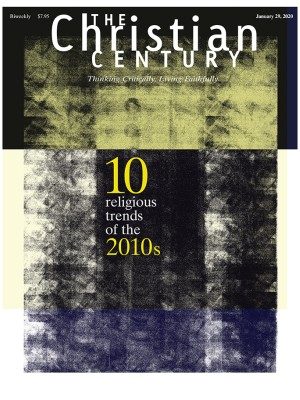How the security culture has burdened women
Natalie Fixmer-Oraiz shows how the post-9/11 US has intensified control of women’s bodies.
A few months ago, my child sang at our town’s commemoration of the events of September 11, 2001. I stood with a large crowd on the lawn of city hall, listened as the children sang “God Bless America,” and tried to quiet my raging inner monologue. All of the invited clergy were older men, and all who prayed aloud did so in the name of Jesus. The rhetoric was as simplistic as it was in those first days and months after 9/11, the lack of critical reflection all the more glaring in light of the many years that have passed and how massive a failing the wars on terror proved to be. It seemed we’ve learned nothing in the intervening years.
In Homeland Maternity, Natalie Fixmer-Oraiz details the particular ways in which the 9/11 attacks have shaped United States culture and intensified already established means of regulating women’s bodies. Her vivid, cogent argument posits that in the decades since 2001 women’s reproductive lives have been increasingly co-opted by “security culture.” In an era labeled as a “time of crisis,” the state’s interest in women’s bodies overrules women’s agency and the demands of justice.
Read our latest issue or browse back issues.
In four related case studies, Fixmer-Oraiz describes how women are variously affected by the new reproductive regime. White professional women are encouraged to freeze their eggs and to secure their fertility as a source of their value over and above their individuality or vocation. Poorer women of color are castigated for bearing children “they can’t afford” and subjected to a host of racist, classist narratives that persist largely uncritiqued.
Critiques of “emergency contraception” are filled with misinformation, Fixmer-Oraiz shows, but they still flourish within “family values” politics that stresses sexual abstinence. Women’s access to medical treatment is considered less significant than the regulation of women’s sexual desires and practices. If emergency contraception is readily available, representatives of the reproductive regime often ask, what is to prevent women from having all the sex they want? (It bears repeating that emergency contraceptives only prevent pregnancy and are not the same as medically induced abortions.)
The fourth case study takes up media representations of teen pregnancy, particularly among white teenagers. Fixmer-Oraiz examines the ways adoption is posited as the only moral and tenable choice for a teen mother.
Fixmer-Oraiz carefully reveals both the unseen threads that tie together the disparate experiences of women in the United States and the broader political landscape. Despite vast differences in privilege, access, age, and context, American women hear remarkably similar things: A woman’s worth lies in her mothering, but not all women should be mothers. A pregnant woman’s life is separate from that of the child she carries and she cannot be trusted to act in the best interest of the pregnancy; at the same time, she is responsible for all risks posed to her offspring both in utero and after birth. We live in a time of ongoing emergency and endless war, so the rights, desires, and agency of individual women must be sacrificed for the greater good.
Standing at the 9/11 remembrance, I thought of how much has changed since 2001—and how much hasn’t changed at all. A woman can ostensibly purchase emergency contraception over the counter in many states, but only if her pharmacist doesn’t have a personal objection to stocking or selling it. Ohio recently passed a bill suggesting that ectopic pregnancies must be “reimplanted” or doctors will face prosecution. This is a medical impossibility. Fixmer-Oraiz details the cultural, political, and rhetorical forces that contribute to this type of legislation that, while absurd, frequently leads to tragedy for women, particularly those who are already marginalized.
Homeland Maternity touches on some of the ramifications of the evangelical purity culture that rapidly gained power and influence in the late ’90s and first decade of this century, but otherwise religious voices are largely missing. This is not an oversight on the author’s part, however, but a reflection of the mainline church’s failure to address issues of women’s health, agency, and personhood in a misogynistic culture.
One of the greatest strengths of the book is the way Fixmer-Oraiz shows how burdens on women vary according to social location. Most of my parishioners have never struggled to get the reproductive care they need. They may not see the ways in which women are asked to carry the burdens and responsibility for protecting families and raising children—and are routinely shamed for challenging such expectations. They might not be aware that in our ill-fated attempts to find security we are regulating marginalized women and robbing them of agency.
Despite the devastating picture Homeland Maternity paints, it provides glimpses of hope. Above all, we need legislative strategies and health-care reform. We can move toward those goals, Fixmer-Oraiz believes, by changing the stories we tell or even simply by reconsidering how we tell them. Do we believe an unwed Judean teenager can be a God-bearer? Do we believe anything good can come out of Nazareth, or Central America, or impoverished urban neighborhoods? Fixmer-Oraiz reminds us that the dominant narratives, especially narratives about women, are not always accurate. There are better stories we could be telling.
A version of this article appears in the print edition under the title “Women’s agency since 9/11.”






